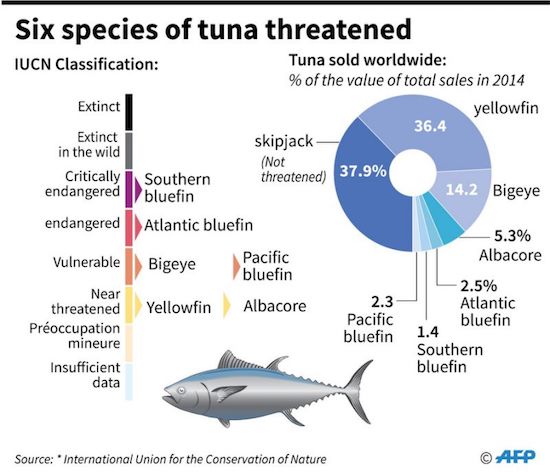
Henri Rousseau The waterfall 1910

Simple and direct swindle. I’ll guarantee your debt if you guarantee mine, it doesn’t matter if we’re both broke. Beijing has known about this for years, but like with the shadow banks, decided to let it flourish because that meets its goals. Both are examples of how China can ‘grow’ its debt, without this showing up in its books. Don’t let the PBOC do it, people can see that.
• China’s Next Crisis: Companies Guaranteeing Each Other’s Debt (ZH)
[..] the province of Shandong has emerged as the potential epicenter for the next debt crisis: here, at least 20 private firms provide guarantees that account for at least 10% of their total net assets – a ratio surpassing all other regions, according to Lv Pin, an analyst from CITIC Securities. “Private firms in Shandong have been exposed to more risks as they are caught up in the cross-guarantee trap, with bonds being dumped on the secondary market,” said Chen Su, bond portfolio manager at Qingdao Rural Commercial Bank Co. And, as noted above, local companies started suffering more financing difficulties as banks cut lending to this region earlier this year, Su said.
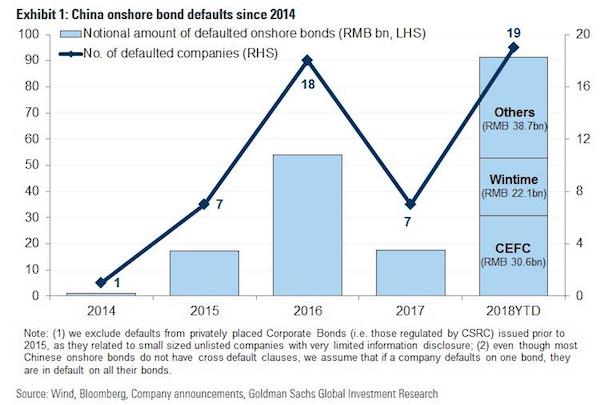
What makes this particular problem especially vexing is that, like a loose thread, once one company with cross-guarantees finds itself unable to fund its debt obligations, a cross-guarantee cascade is sprung, and dozens of other firms may end up unable to either satisfy their “guaranteed” commitments to the original debtor, until – ultimately – they are unable repay their own creditors. Bloomberg notes that cross-guarantee troubles have been cropping up for a while: “When a disclosure last year showed that Shandong Yuhuang Chemical Co. had guaranteed 1.35 billion yuan of obligations tied to Hongye Chemical Group, yields on Yuhuang’s 2020 dollar note shot up more than 2.30 percentage points in a week.”
For now, there hasn’t been a default serious enough to drag down numerous firms at the same time, although that may soon change. However, to make sure it doesn’t, China is engaging in what it does best to avoid a credit crisis: government funded bailouts. Sure enough, the province of Shandong is making efforts to avert any credit collapse. Its state assets regulator said a government-backed 10 billion yuan fund will be set up to address liquidity risks at listed companies, the China Securities Journal reported on Friday. More broadly, as we reported two weeks ago, China’s central bank has launched initiatives to aid credit to small and medium enterprises, and support bond issuance.
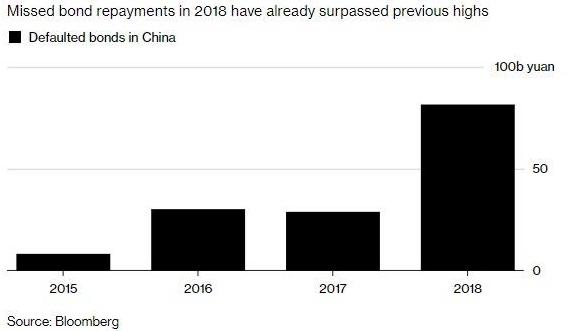

The spike is guaranteed, it’s only the timing that’s not.
• Another Volatility Spike May Be Ahead (Colombo)
The chart below shows the VIX Volatility Index, which appears to be forming a triangle pattern that may indicate that another big move is ahead. If the VIX breaks out of this pattern in a convincing manner, it would likely lead to even higher volatility and fear (which would correspond with another leg down in the stock market). On the other hand, if the VIX breaks down from this pattern, it could be the sign of a more extended market bounce or Santa Claus rally ahead.
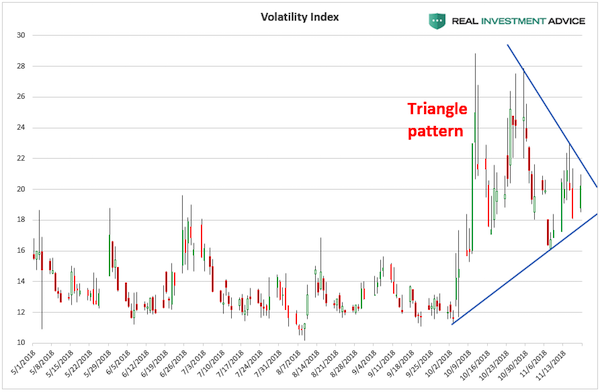
In my early-October volatility warning, one of the charts I showed was the inverted 10-year/2-year Treasury spread and how it leads the VIX by approximately three years. According to this logic, the January and October volatility spikes were only the beginning of a much larger bullish volatility cycle (ie., one that accompanies a full-blown bear market).
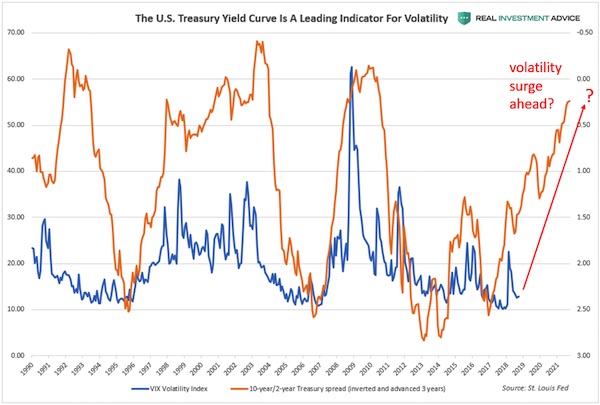

Easy money, easy losses.
• FANGMAN Stocks Plunge 4.4%, Down $905 Billion, or 20%, since Aug. 31 (WS)
Folks who went through the wholesale Nasdaq destruction of 2000-2002 will just smile mildly because that’s when the Nasdaq, as the dotcom bubble imploded, lost 78%. Given our Everything Bubble is even bigger and crazier, the Nasdaq’s current sell-off barely registers on my own Richter scale, so to speak. The Dow fell 1.6%, is down just 7.2% from its peak, and for the year is clinging to a 1.2% gain. And the S&P 500 dropped 1.7% today and is down 8.5% from the peak. It too remains, if by the thinnest margin, in the green for the year. Nevertheless, real sums have started to evaporate. And much of it happened with the biggest stocks in so-called tech.
The seven FANGMAN stocks – Facebook, Amazon, Netflix, Google’s parent Alphabet, Microsoft, Apple, and NVIDIA – got hosed today. Again. Their combined market cap dropped 4.4% today, giving up $170 billion without breaking into a sweat. Since their combined market-cap peak of $4.63 trillion at the end of August, $905 billion have dissolved into ambient air. Down 19.6% in ca. 11 weeks. Despite the sell-off, the FANGMAN as a whole are still green for the year, and are back where they’d first been on January 11. So, from that perspective, this $905 billion that disappeared isn’t any kind of big deal unless it’s your money that disappeared along with it:
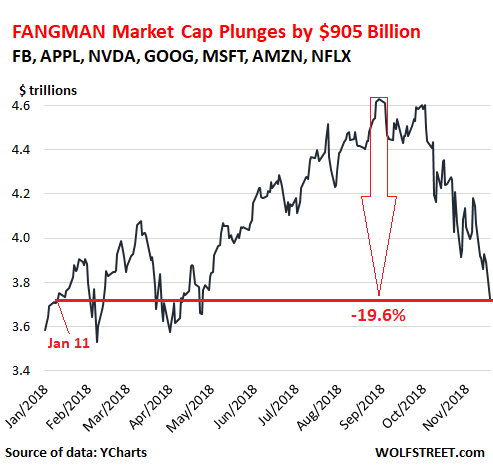
Let’s start by blaming Apple due to its number 1 mega-cap status. Its shares dropped nearly 4% today and are down 20.4% from their peak at the beginning of October. Once upon a time, the company was worth $1.12 trillion. It ended the day at $882 billion. $238 billion gone in ca. eight weeks. Not a day goes by when we don’t hear from an Apple supplier blaming an unnamed huge customer that can only be Apple for having to slash their revenue forecasts – apparently because three iPhone models are not selling very well. Apple’s principle that it can always make up for falling sales of devices by raising prices even further on the fewer devices it sells can only succeed for so long. At some point, consumers switch to something else or just refuse to “upgrade” at an ever faster rate, as Apple has to raise prices at an ever faster rate…. You know where this is going.

Making tens of millions a year wasn’t enough.
• Nissan-Renault-Mitsubishi Chief Ghosn Arrested Over Financial Misconduct (AFP)
Nissan chairman Carlos Ghosn faces being fired this week after being arrested in Japan over allegations of financial misconduct, the firm said Monday, in a stunning fall from grace for one of the world’s best-known businessmen. Ghosn’s arrest and his likely dismissal from Nissan, as well as possibly from Mitsubishi and Renault, sent shockwaves through the auto industry, where he is a towering figure, credited with turning around several major manufacturers. Besides being chairman of Nissan, the 64-year-old is also CEO of Renault and leads the Nissan-Renault-Mitsubishi alliance.
Nissan’s board will meet Thursday to decide his fate, and Mitsubishi said it would propose he be dismissed as chairman “promptly.” Renault said its board would meet “shortly”, after Ghosn was detained over allegations including underreporting his income. At a hastily organised press conference, Nissan CEO Hiroto Saikawa expressed “despair,” but also suggested that Ghosn had accrued too much power and eluded proper oversight. “Too much authority was given to one person in terms of governance,” he told reporters at Nissan’s headquarters in Yokohama. “I have to say that this is a dark side of the Ghosn era which lasted for a long time.”
The news of Ghosn’s downfall emerged unexpectedly on Monday evening, with local media first reporting he was being questioned by prosecutors and that Nissan’s headquarters was being raided. Shortly afterwards, Nissan said in a statement that it had been investigating Ghosn and Representative Director Greg Kelly for months after a whistleblower report. “These two gentleman are arrested this evening, that’s what I understand,” Saikawa said at the press conference. He said the company had uncovered years of financial misconduct including under-reporting of income and inappropriate personal use of company assets.
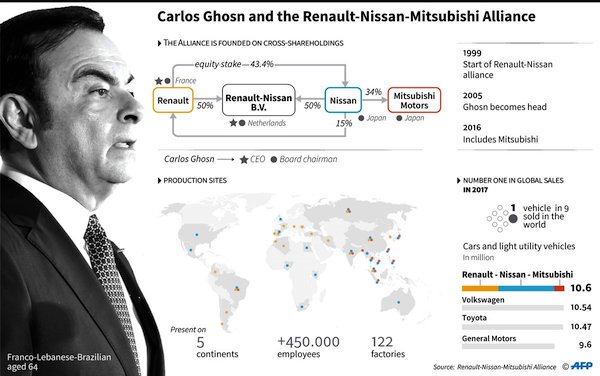

Waiting for the King to die. Then let the war games begin. Meanwhile, can Trump afford to contradict the CIA? If he follows the CIA conclusion that MbS did it, what risk is that to the petrodollar? Shouldn’t Congress speak out on this?
• Dozens In Saudi Royal Family Turn Against Crown Prince (R.)
Amid international uproar over the killing of journalist Jamal Khashoggi, some members of Saudi Arabia’s ruling family are agitating to prevent Crown Prince Mohammed bin Salman from becoming king, three sources close to the royal court said. Dozens of princes and cousins from powerful branches of the Al Saud family want to see a change in the line of succession but would not act while King Salman – the crown prince’s 82-year-old father – is still alive, the sources said. They recognize that the king is unlikely to turn against his favorite son, known in the West as MbS. Rather, they are discussing the possibility with other family members that after the king’s death, Prince Ahmed bin Abdulaziz, 76, a younger full brother of King Salman and uncle of the crown prince, could take the throne, according to the sources.
Prince Ahmed, King Salman’s only surviving full brother, would have the support of family members, the security apparatus and some Western powers, one of the Saudi sources said. Prince Ahmed returned to Riyadh in October after 2-1/2 months abroad. During the trip, he appeared to criticize the Saudi leadership while responding to protesters outside a London residence chanting for the downfall of the Al Saud dynasty. He was one of only three people on the Allegiance Council, made up of the ruling family’s senior members, who opposed MbS becoming crown prince in 2017, two Saudi sources said at the time.

Germany decides for 26 other sovereign nations who they can let in (yeah, they talked to France and UK). Can Hungary do the same? If not, that’s a really big problem for the EU. Some more equal than others.
• Germany Bans 18 Saudis Linked To Khashoggi Murder From Schengen Zone (AP)
Germany’s foreign minister says Berlin has banned 18 Saudi nationals from entering Europe’s border-free Schengen zone because they are believed to be connected to the killing of journalist Jamal Khashoggi. Heiko Maas told reporters in Brussels on Monday that Germany issued the ban for the 26-country zone in close co-ordination with France, which is part of the Schengen area, and Britain, which is not. “There are more questions than answers in this case, with the crime itself and who is behind it,” he said. Turkish and Saudi authorities say that Khashoggi was killed on Oct. 2 in Istanbul by a team from the kingdom, after he went to the Saudi Consulate to get marriage documents.
Maas said the 18 Saudis are “allegedly connected to this crime” but gave no further information. His Berlin office said they can’t release the names due to German privacy protections. The move comes a day after U.S. President Donald Trump said there was no reason for him to listen to a recording of the “very violent, very vicious” killing of Khashoggi, a columnist for the Washington Post who had been critical of Saudi Crown Prince Mohammed bin Salman.

They won’t do anything, other than banning a few people pointed out by the Saudi’s themselves: “..we don’t intend to meddle in how the Saudi authorities are going to resolve this.”
• France Says To Decide Soon On Sanctions Over Khashoggi Killing (R.)
France will decide very soon to impose sanctions on individuals linked to the murder of Saudi journalist Jamal Khashoggi, Foreign Minister Jean-Yves Le Drian said on Monday. “We are working very closely with Germany at this moment … and we will decide ourselves a certain number of sanctions very quickly over what we know (about the murder),” Le Drian told Europe 1 radio when asked whether Paris would follow Germany in imposing travel bans on Saudi individuals. “But we believe that we need to go beyond that, because the whole truth needs to be known.” “We want all the truth to be established and today it’s not the case. When I say all the truth, I mean the circumstances, those responsible need to be designated and once we’ve decided ourselves on the subject then we’ll take the necessary sanctions.”
French reaction has been relatively guarded given it is keen to retain its influence with Riyadh and protect commercial relations spanning energy, finance and military weapons sales. Asked about a CIA assessment blaming Saudi Crown Prince Mohammed bin Salman (MBS) for the killing and whether he could stay in his position, Le Drian said Paris had no intention of meddling in Saudi affairs. “He took some very strong initiatives that nobody was expecting … very significant initiatives and a modernization project that everyone appreciated,” Le Drian said. “What we’re seeing today is that it’s more complicated than that, but we don’t intend to meddle in how the Saudi authorities are going to resolve this.”

Look like this might be what he US gets from the Khashoggi killing.
• Saudis, Houthis Agree To Yemen Peace Talks (ZH)
The prospect for peace – or at least a lasting ceasefire – is advancing rapidly following a surprise weekend proposal by Yemen’s Houghis to halt all attacks on Saudi coalition forces. On Sunday the head of Yemen’s Iran-backed Houthi Supreme Revolutionary Committee Mohammed Ali al-Houthi, said “We are willing to freeze and stop military operations” — something which now appears to have taken effect, according to a breaking Reuters report. In the biggest turning point in the war which has raged since 2015, Reuters confirms: “Houthi rebels in Yemen said on Monday they were halting drone and missile attacks on Saudi Arabia, the United Arab Emirates and their Yemeni allies, responding to a demand from the United Nations.”
“We announce our initiative…to halt missile and drone strikes on the countries of aggression,” an official Houthi statement reads. Crucially, it appears this halt in fighting was precipitated by a Saudi agreement to the Houthi extension of an olive branch as according to the AFP Yemen’s internationally recognized Saudi-backed government says it has informed UN envoy Martin Griffiths it is ready to take part in proposed peace talks with Houthi rebels to be held in Sweden. “The [Saudi-backed Yemen] government has informed the UN envoy to Yemen … that it will send a government delegation to the talks with the aim of reaching a political solution,” Yemen’s pro-Saudi foreign ministry said, quoted by the official Saba news agency.
[..] On Monday Saudi King Salman told his country’s top advisory body, the Shura Council: “our support for Yemen was not an option but a duty… to help the Yemeni people confront the Iran-backed militias” — choosing to frame the ceasefire as if Riyadh has been on the side of “the people” the whole time. The King agreed there should be a “political solution” and a “comprehensive national dialogue” in Yemen, according to Reuters.

Tech progress has bypassed the US. It can’t even organize an election.
• A Revote Is Necessary After Brenda Snipes Resigns (Vos)
Recent press reports indicated that Brenda Snipes submitted her resignation from her position as Broward County Supervisor of Elections. The news does little to ameliorate the devastating corruption riddling Broward County politics. In the eyes of many observers, Snipes and her associates should rightfully be serving prison sentences for repeated election rigging that became colloquially known as the ‘Brenda Snipes Process.’ Shortly after the news was announced, Tim Canova called for the resignation of Snipes’s Director, Dozel Spencer. Likewise, many point out that Brenda Snipes is simply the public face of a deeply corrupt political system, and without real change, business will most likely continue as usual in the Southern Florida county.
In this writer’s opinion, two steps are as necessary as they are unlikely to be implemented: invalidation of the congressional race in the 23rd Congressional district, and prosecution of those involved in election rigging, including Debbie Wasserman-Schultz. As readers may recall, Brenda Snipes and former DNC Chairwoman Debbie Wasserman Schultz have been responsible for multiple instances actual election interference and actual data breaches that may have benefitted foreign interests. While the entire beltway establishment collectively lost its mind over fictitious allegations of Russian hacking and election interference, the real culprits have escaped both punishment and press scrutiny. It was Wasserman-Schultz who infamously worked to tip the scale in favor of Hillary Clinton’s campaign during the 2016 Democratic Primary.
She is the only defendant named personally in the ongoing DNC Fraud lawsuit, in which lawyers for the defense infamously argued that the DNC has the right to favor one primary candidate over another, later claiming that such practice is protected by the first amendment, despite the fact that it runs contrary to the party’s charter. Shortly before this year’s midterms, Donald Trump’s Department of Justice announced it would not prosecute the Awan scandal, in which Debbie Wasserman-Schultz was also personally embroiled. Disobedient Media’s Kenneth Whittle reported on concerns that the Awan brothers may have passed sensitive material stolen from Congress members to countries including Israel, Saudi Arabia, and China via Pakistan’s intelligence agency, the ISI.

He gets a single question.
• White House Restores Acosta’s Press Pass, Issues News Conference Rules (MW)
The White House said Monday it restored CNN reporter Jim Acosta’s press pass, as well as instituted a set of rules to govern future news conferences. Acosta’s pass had been revoked — then temporarily restored by a judge — following a testy news conference with President Donald Trump. White House press secretary Sarah Sanders said the administration notified Acosta his pass was restored, but also that he and other reporters would need to abide by four rules. The rules direct a journalist to ask a single question; permit journalists follow-up questions at the discretion of the president or other officials; require journalists to give up a microphone to other journalists; and threaten the revocation of journalists’ passes for not respecting the rules.
Sanders also hinted at the possibility more rules could be forthcoming. “It would be a great loss for all if, instead of relying on the professionalism of White House journalists, we were compelled to devise a lengthy and detailed code of conduct for White House events,” she said in a statement. Acosta and Trump sparred at a Nov. 7 news conference. Judge Timothy Kelly, a Trump appointee, later temporarily restored Acosta’s credentials. The rules and restoration of his pass come after the administration initially indicated it planned to try to keep excluding the CNN reporter from the White House.

Not a lot of shame left there. Straight back to the days of Marx and Dickens.
• Britain’s Enemy Is Not Russia But Its Own Ruling Class (Wight)
As the UK political establishment rips itself to pieces over Brexit, a far greater crisis continues to afflict millions of victims of Tory austerity. A devastating UN report into poverty in the UK provides incontrovertible evidence that the enemy of the British people is the very ruling class that has gone out of its way these past few years to convince them it is Russia. Professor Philip Alston, in his capacity as the United Nations Special Rapporteur on extreme poverty and human rights, spent two weeks touring the United Kingdom. He did so investigating the impact of eight years of one of the most extreme austerity programs among advanced G20 economies in response to the 2008 financial crash and subsequent global recession.
What he found was evidence of a systematic, wilful, concerted and brutal economic war unleashed by the country’s right-wing Tory establishment against the poorest and most vulnerable section of British society – upending the lives of millions of people who were not responsible for the aforementioned financial crash and recession but who have been forced to pay the price. From the report’s introduction: “It…seems patently unjust and contrary to British values that so many people are living in poverty. This is obvious to anyone who opens their eyes to see the immense growth in foodbanks and the queues waiting outside them, the people sleeping rough in the streets, the growth of homelessness, the sense of deep despair that leads even the Government to appoint a Minister for Suicide Prevention and civil society to report in depth on unheard of levels of loneliness and isolation.”
Though as a citizen of the UK I respectfully beg to differ with the professor’s claim that such social and economic carnage seems “contrary to British values,”(on the contrary it is entirely in keeping with the values of the country’s Tory establishment, an establishment for whom the dehumanization of the poor and working class is central to its ideology), the point he makes about it being “obvious to anyone who opens their eyes,” is well made. For it is now the case that in every town and city centre in Britain, it is impossible to walk in any direction for more than a minute before coming across homeless people begging in the street. And the fact that some 13,000 of them are former soldiers, casualties of the country’s various military adventures in recent years, undertaken in service to Washington, exposes the pious platitudes peddled by politicians and the government as reverence for the troops and their ‘sacrifice,’ as insincere garbage.

Oh yeah, we’re doing just great. Paper parks don’t protect a thing.
• Surge In Marine Refuges Brings World Close To Protected Areas Goal (G.)
A record surge in the creation of marine protected areas has taken the international community close to its goal of creating nature refuges on 17% of the world’s land and 10% of seas by 2020, according to a new UN report. Protected regions now cover more than five times the territory of the US, but the authors said this good news was often undermined by poor enforcement. Some reserves are little more than “paper parks” with little value to nature conservation. At least one has been turned into an industrial zone. More than 27m square kilometres of seas (7% of the total) and 20m sq km of land (15% of the total) now have protected status, according to the Protected Planet report, which was released on Sunday at the UN biodiversity conference in Sharm el-Sheikh, Egypt.
Almost all of the growth has been in marine regions, most notably with the creation last year of the world’s biggest protected area: the 2m sq km Ross Sea reserve, one-fifth of which is in the Antarctic. The no-fishing zone will be managed by New Zealand and the US. “We have seen an enormous expansion in the past two years. There is now more marine protected area than terrestrial, which nobody would have predicted,” said Kathy McKinnon of the International Union for the Conservation of Nature. “I think we’ll continue to see a substantial increase, I’d guess, to at least 10% in the near future.” The UN convention on biological diversity says it has received national commitments for an additional 4.5m sq km of land and 16m sq km of oceans to be given protected status in the next two years.

I have an idea how this is going to end. Jellyfish sandwiches.
• Fishing Nations Fail In Bid To Cut Quotas For Depleted Bigeye Tuna (AFP)
Dozens of nations on Monday failed to agree on measures to preserve one of the planet’s most valuable fish: the bigeye tuna, backbone of a billion-dollar business that is severely overfished. Some 50 countries as well as European Union member states wrapped up a meeting of the International Commission for the Conservation of Atlantic Tunas (ICCAT) in the Croatian seaside city of Dubrovnik without reaching a consensus on quotas. “It’s a setback and it’s bad news,” said Javier Garat Perez, secretary general of the Spanish fishing confederation Cepesca. Scientists shocked many in the industry last month when they warned that unless catch levels are sharply reduced, stocks of the fatty, fast-swimming predator could crash within a decade or two.
They warned that populations had fallen to less than 20 percent of historic levels. Less iconic than Atlantic bluefin but more valuable as an industry, bigeye (Thunnus obesus) – one of several so-called tropical tunas – is prized for sashimi in Japan and canned for supermarket sales worldwide. Three years ago, ICCAT introduced a 65,000-tonne catch limit for the seven largest fishers of bigeye, and a moratorium in certain areas of ocean. But other countries are not bound by the quotas, and bigeye hauls last year topped 80,000 tonnes – far too high to begin replenishing stocks.
